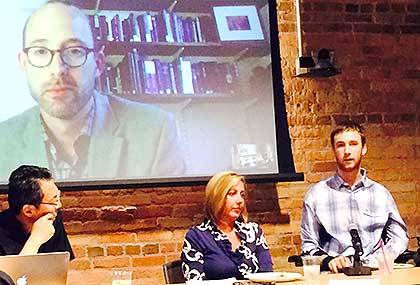
To Jay Ruckelshaus, the struggles facing people with disabilities were largely abstract until the day he was paralyzed in a diving accident.
For Leigh Fickling, it came when a virus attacked the sheath protecting her spinal cord, leaving her with a neurological condition similar to multiple sclerosis.
And for Tsai Lu Liu, it changed the day his son was born with cerebral palsy.
“Before my son, I always thought disability was other people’s business,” Liu recounted Tuesday during a panel discussion of the Americans with Disabilities Act, which turned 25 years old this year.
Liu, Fickling and Ruckelshaus each discussed how their experience with disabilities has changed their academic and professional lives. They appeared as part of a Franklin Humanities Institute initiative called Health Humanities, which aims to connect medicine and the humanities in hopes of improving patient care and bettering the lives and careers of doctors, nurses and other healthcare professionals.
Ruckelshaus is a Duke undergraduate who has emerged as a compelling voice on behalf of people with disabilities.
Liu heads the graphic design and industrial design department at N.C. State University, where he teaches students to consider the needs of more than just the able-bodied when considering the design of products and places.
And Fickling directs Duke’s Disability Management System. She spoke emphatically Tuesday about the importance of institutions to do more for disability compliance than just what the law demands. She believes universities in particular can do a better job of knowing their disabled students and employees.
As she notes: A building can comply with federal standards if it has a wheelchair ramp and an accessible bathroom. But can they be grouped together? Is there a better design?
“You think you’re doing the right thing,” said Fickling. “But until we look at people as individuals, and not be scared of them, we won’t be an inclusive society.”
The three panelists were joined via Skype by Todd Carmody, a Harvard University lecturer who teaches about the history of disability and how it is represented in literature.
Health and the Humanities
The seminar was the latest attempt to approach a health issue from a variety of disciplinary approaches, says Deborah Jenson, the new FHI director and professor of French, Romance Studies and Global Health. It attempts to move higher education past a time when the only humanities piece of a medical school education was a lone course on the history of medicine. The hope, at Duke and at other universities, is to weave touches of the humanities into both med school curriculums and exam rooms.
“Health connects to life and death issues, to life balance, wisdom, fulfillment and identity,” Jenson says. “There are all kinds of ways that the humanities can engage with medicine.”
Jenson has long straddled the invisible line between the health and the humanities. As co-director of Duke’s Haiti Lab, she tracked the history of cholera in Haiti and the Caribbean. She has repeatedly taught “Flaubert’s Brain,” a Duke course at the intersection of neuroscience and literature. And she recently co-taught a course for Duke psychiatry residents on trauma and language that targeted the most fundamental piece of the doctor/patient relationship – their verbal interactions.
“Rhetoric used to be the foundation of education,” she says. “This is a return to emphasizing that we all use language and we can all do it better.”
The Health Humanities Initiative began earlier this year with an event focusing on social media and patient engagement. It has since featured an autistic poet and a museum director who creates exhibits for people with dementia. In October, it will present Terrence Holt, a medical school professor at UNC-Chapel Hill with a master’s degree in creative writing whose most recent novel, “Internal Medicine,” is a fictionalized memoir of his experiences as a hospital physician.
“Beyond helping to train compassionate and humanistic health care providers and providing new therapeutic interventions, the health humanities can offer us novel, interdisciplinary ways of thinking about health and what it truly means to be ‘well,’ ” said Duke Provost Sally Kornbluth.
Dhipthi Mulligan studied comparative literature as an undergraduate before going to medical school. Now a psychiatrist at Duke, she developed the trauma and language course with Jenson in 2013 and now teaches it to psychiatry residents. The course makes psychiatrists more aware of language and the ways patients speak and the metaphors they use describe themselves, which often leads to more rich interactions and better care, she says.
“There’s a different set of skills you use when you engage with the humanities,” Mulligan says. “It’s a different way of thinking and it helps us listen to our patients better.”
A Better Design for Everything
On Tuesday, panelists discussed how they try to make a difference.
At N.C. State, Liu challenges students to consider new designs for everyday products that won’t saddle a disabled person with a stigma. Can a wheelchair look sleek and cool? Can a telephone look streamlined rather than big and boxy and still be useful for the vision-impaired?
Many products seem to conspire against the disabled, Liu noted, from the glass Pyrex measuring cup with a difficult-to-grip handle to the Blackberry device, whose tiny buttons and type can be problematic, he said.
“As designers, we can make things that everyone can love,” he said.
Ruckelshaus has embraced the public debate, but he looks forward to a day when he doesn’t have to do so.
“There should be freedom not to have to fight (for the cause),” he said. “I should be able to go to class and not talk about disability if it happens to comes up in a reading or discussion.”